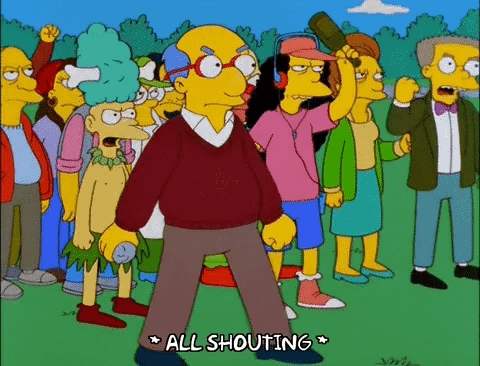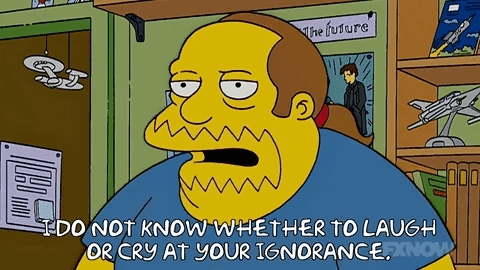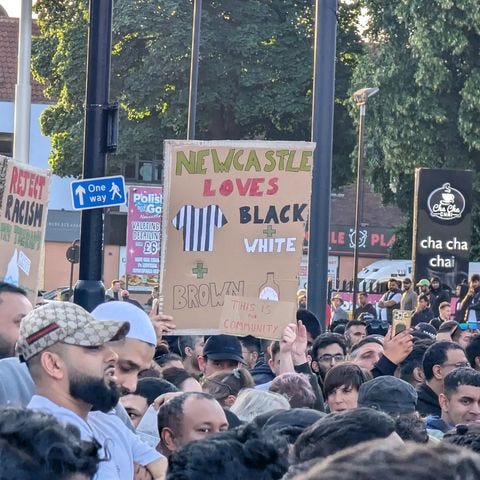I really wanted to dodge this topic this week, but I just couldn’t.
Everywhere I look, there are clips of riots in the cities I’ve called home, snippets of news articles about racist attacks, and updates from small businesses and charities closing their doors in anticipation of riots.
I will first point to
’s newsletter from yesterday about how racism is endemic in this country, and while these scenes are shocking, the views are nothing new:It has not come from nowhere. It has been brewing for some time. The violence may die down, but the wounds won’t heal by themselves.
This is racism we’re seeing. It is terrorism. And that leaves lasting scars.
It’s important to remind ourselves of that, and to use those words to describe it.
Part of the reason why I wasn’t going to write about this this week was because I feel like I can’t add anything to the discussion that hasn’t already been said. But then I noticed a series of micro-aggressions from different parts of my life, and I wanted to explore a couple of observations I’ve made over the last week or so since this chaos leaked out onto our streets.
It starts with us
Firstly, I saw a great Instagram post that said, “Ignoring racism is racism”, and this has been replaying in my head over the last few days.
How do you react if you hear a friend or family member saying something you believe to be racist? You’d think that most people would “see something, say something,” and yet, in my experience, that doesn’t seem to be true at all.
In reality, I have known people to be told to “calm down” or even pushed out when questioning the use of micro-aggressions in casual conversation. We’ve all probably heard someone use a racist term to describe a person or make a comment about “them” coming over “here”.
But what you do in response to that is likely different to the next person.
Many of us will feel regret that we didn’t say anything, driving home wishing we’d told our racist uncle not to refer to the local shop as that. Or deleting a comment on your neighbour’s fake news post about the torrent of small boats.
We do this because we are guided by social expectations and, for most people, the risk of becoming a social pariah outweighs the benefit of calling someone else out on their behaviour.
I have often wondered why I struggle with this, as I’d have always preferred to be alone on the fringe, knowing I am doing the right thing, than be accepted by the masses for simply staying silent.
I am on my own neurodivergence journey (which I will probably write about in a future post as I unravel it for myself), and part of this is reassessing past behaviours and exploring them through a different lens.
Autistic people and those with ADHD often have strong justice sensitivity. This means they will likely stand up for what they believe, and their lack of understanding or conforming to social norms, allows them to speak up without fear of social exclusion.
[O]ne of the most common features of autistic people is that they have an innate sense of justice – they can't stand to see injustice around them, even if it's not directed at them - Autism - Myth and Reality, The British Psychological Society (Oct 2014)
For me, and for many of you reading, this might shed some light on why it seems impossible to stand back when the smallest ‘jokes’ are thrown about at the pub.
I wrote about this back in 2022, before it ever occurred to me that I might be neurodivergent:
Speaking to people with differing views is important, as it helps to shape your own perspective and also gives them the opportunity to see something from another angle. However, if you’re anything like me then you might find it hard not to get emotional about certain topics - which doesn’t always land in your favour.
Racism isn’t just about attacking people in the streets; it’s in quiet conversations, pub debates, and off-hand remarks— and that’s where we should start putting out the spark before it turns into a forest fire.
Fake news
This newsletter is about being chronically online, and yet the most internet-obsessed people are usually older relatives glued to Facebook feeds, actively spreading gossip and misinformation.
We’ve not just seen this with racism but also in the story of Algerian boxer Imane Khelif’s Olympic victories following unfounded questions about her biological sex.
I won’t even waste anymore of my time on the latter, as the whole topic is quite frankly idiotic. If you want to read more about Khelif’s completely legitimate success, and how Russia's corruption played a vital role in the wildfire of misinformation, you can read this great piece on Medium by Jesse Owen:
In doing so, we have inadvertently supported a narrative created by an agent of a imperialist, autocratic, Far Right regime to serve as a convenient smokescreen to cover various crimes. What we SHOULD be discussing is why the Far Right authoritarians can so easily bait us into heated transphobic arguments and how those arguments are too often a convenient distraction from their corruption and theft.
So, what do these narratives have in common? They are both being spread freely on the world’s biggest social media platforms, with no calls for fact-checking. I’d argue that critical thinking is less common than ever, as the online discourse so often pushes us to view every subject as a binary.
wrote about the wild-west of social media in her newsletter this week:Social media channels like X continue to enable far-right material to circulate, stoking the flames of hatred. Musk’s unsubstantiated claims of ‘civil war’ prove only that his purchase of the platform was no mistake - it was calculated and deliberate.
There’s rumours that bots programmed to destabilise the West through political dissonance continue to run rife online - that world continues to go un-policed and unregulated.
This is just one of dozens of similar posts I’ve seen in the last month or so on Facebook:
It goes without saying that ‘whataboutisms’ like this are often at the core of social media discourse— if you care about one thing, then you must care about another. It’s never that simple, and in the above case, it certainly isn’t.
So, while I said I didn’t even want to write about this topic this week, the email has ended up being pretty long, so I’ll end it here.
We are united
Just as I was about to send this, I spotted several posts about the fantastic display of unity across Newcastle last night. Remember, the minority often shouts the loudest in times like this, leading us to forget that the majority of good people in our lives don’t believe this hate.
We will not tolerate racism in this city— and, for me, that’s not just about counter-protests but also about calling it out in the pub, at family events and when casually chatting with the neighbours.
Don’t stand down.
Don’t turn a blind eye.
See something? Say something.
There has been glorious weather in the North East this week, so I’ve been touching plenty of grass. I have less than two weeks until my next half marathon, so I’ve been enjoying sunny jogs (for about 1km before I realise I am too hot and want to die).
I also got away to a lovely lodge for the weekend, enjoyed the hot tub, and explored the quaint town of Richmond, Yorkshire.



Things I’ve also enjoyed this week:
📚Evenings And Weekends by Oisín McKenna - Wow, one of my favourite books I’ve read all year. This debut novel is set over a weekend in London and tells of a group of friends, all with their own burdens and problems to face. I really loved how this was written, and each character had such a unique voice. I avidly await whatever McKenna does next.
There’s not much else to mention here, as all I have been doing is watching the Olympics. I might have better craic next week (unlikely!).
Until then,
Ellen x
🎧I’m on Spotify!
If you like the audio version of this newsletter, you can listen to them all over on Spotify. Here’s last week’s:
💌 About this email
I’m Ellen, and I write about mental health for the chronically online. I am a freelance copywriter, strategist and web designer, and I work from home with my husband, Craig, at Content By The Sea. We have two rescue greyhounds, Potter and Harmony, and a toddler.
I started this newsletter in March 2020 and have sent over 180 emails; currently, I have over 1,200 subscribers. I write about a wide variety of topics, including diet culture, my love of running, jealousy, my life falling apart, mam guilt, and this dystopian world we all live in.
💛 How you can support me
If you like reading my weekly emails, you can give me a kickback in one or more of the following ways:
📨 Share this post
📬 Subscribe for free (if you haven’t already!)
💬 Leave a comment on this newsletter
💰Sign up to be a paid supporter of the newsletter for just £4 a month or £40 a year.
The current perks of being a paid subscriber are receiving one extra Touching Grass email each month with all of my top films, shows, podcasts and books. And, most importantly, you are supporting me to keep writing this newsletter week after week.









